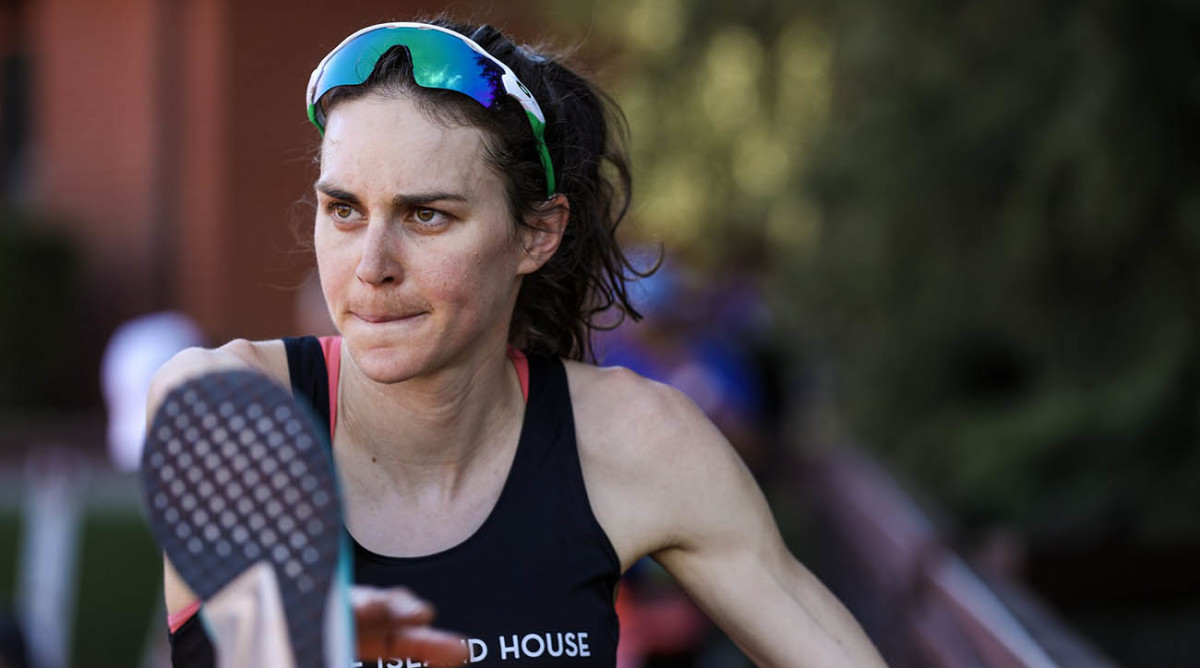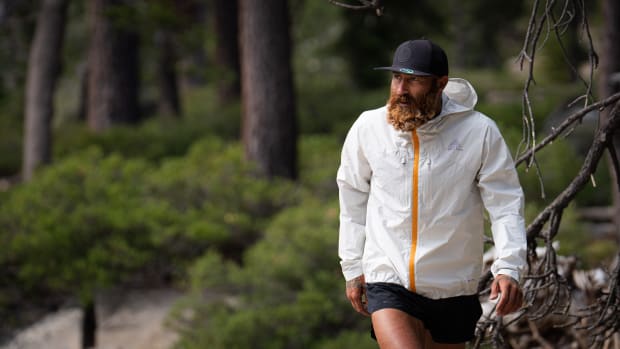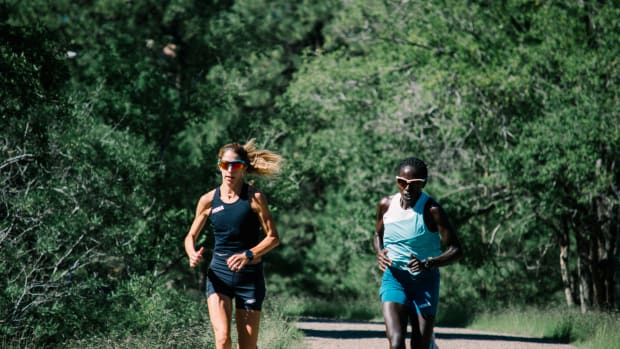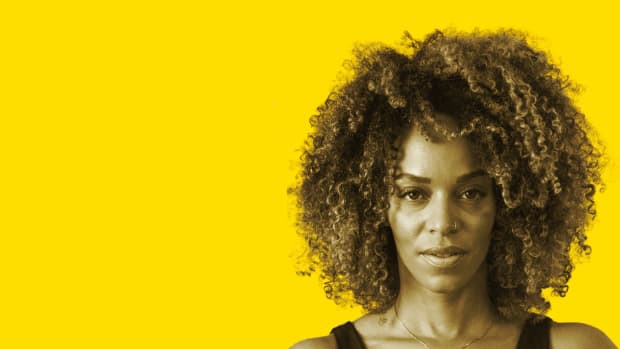A Champion’s New Chase: Gwen Jorgensen on Her Move to Marathoning
On Friday night, Gwen Jorgensen opened up her 2018 outdoor track season as she begins her transition from the triathlon to the marathon, in pursuit of a gold medal at the 2020 Olympics in Tokyo.
Jorgensen became the first American woman to win gold in the triathlon at the 2016 Olympics in Rio de Janeiro and celebrated the performance by running the 2016 New York City Marathon. Without any marathon-specific training, she ran 2:41:01 and finished in 14th place among the elite women. She shelved the 2017 triathlon season to give birth to her first child and in August, Stanley Lemieux was born.
Last November, Jorgensen announced that she was leaving the triathlon behind for her new ambitious goal of adding another Olympic gold medal. No American woman has won a gold medal in the marathon since Joan Benoit Samuelson in 1984, but Jorgensen has made it clear that she wants to be the one to end the drought. At the Stanford Invitational in Palo Alto, Calif., on Friday, Jorgensen ran 31:55.68 in the 10,000 meters, shaving nearly two minutes off her personal best, a time that was from her days as a distance runner at Wisconsin nearly nine years ago.
Jorgensen has joined the Bowerman Track Club, which includes 2017 New York City Marathon winner Shalane Flanagan, 2017 world championship bronze medalist in the marathon Amy Hastings-Cragg and a slew of other Olympians. Coach Jerry Schumacher will oversee her training.
Jorgensen recently spoke with Sports Illustrated at length about her new focus and the decision to train with one of the strongest training groups in the United States.
The following interview has been lightly edited for clarity.
Chris Chavez: When you announced your return to running, the focus was on the marathon. But we can’t jump right into marathons.
Gwen Jorgensen: Exactly. I imagined that I’d just be able to magically jump right into marathon training and that has not been the case. I had never run more than about 40 miles a week previously during triathlon. To think I could jump to 120 miles per week right away was a little silly. The long term goal is obviously Tokyo 2020 and the marathon but right now I’m trying to build up my mileage smartly. I’ve been running maybe 80 miles a week. I’m actually at an altitude camp right now in Woodland Park, Colo. I was hoping to maybe do a half marathon out of it but my coach Jerry Schumacher and I weren’t quite sure if I was ready for that distance. He looked at some other distances and thought there was a 10K on the track so let’s put you in that.
CC: When Ashton Eaton retired from the decathlon, there was a feeling that because he had the world record, world championship gold and two Olympic golds, there wasn’t much left for him to chase or accomplish in the sport. Was that similar to your feeling toward the triathlon before moving away from it?
GJ: Yes. There were a couple things actually. One of them was that I set out to become an Olympic champion. I checked that box. I was a two-time world champion. My motivation to come back to the triathlon just wasn’t there. It wasn’t exciting. Something that excites me is a new challenge and something that I haven’t done before. That’s what gets me motivated and out the door every day for training. To not have that motivation, it didn’t seem right to stay with the triathlon. I talked to my husband, Pat, and I said I could stay in it because I could make better money this year. We both laughed because there’s no reason to stay in this sport for a financial decision. In the sporting world, I think you need to be motivated and willing to put in that work every day. It didn’t seem that my motivation was in the right spot to be able to do that.
The triathlon picked me. USA Triathlon came up to me and said, ‘We think you could be good at this.’ I liked doing the triathlon but I would say that I love running. When I was training for the Rio Olympics, it was really hard to get in that pool every day. I used to love swimming but during that four-year cycle, I just dreaded getting in the water. It was really hard. There was just a few things like that where I didn’t feel like my motivation was right and I feel like I haven’t reached my potential in running and I haven’t given running a shot. That’s something that I want to do.
CC: If I recall correctly, a lot of the narrative surrounding you ahead of Rio was redemption over the bike malfunction that cost you a medal at the 2012 Olympics in London. Do you ever think that if you had won gold or medaled in 2012 that this whole jump into just running would’ve happened four years sooner?
GJ: Ooh. That thought did not cross my mind. One thing I’ve learned is when you prepare for the Olympics and you prepare for one event that happens every four years, you never know how you’re going to feel after that event is accomplished. I talked to Pat and I even called a handful of professional running coaches in 2012 and 2013 to tell them I have this idea that I might want to run one day, what do you think? Some of them said ‘You should stick to triathlon.’ Others said, ‘Who knows? Maybe?’ I’ve had the thought of pursuing running and finding out how good I could be at running for a while. Something I’ve learned about the Olympics is just there’s no way you can plan until after that Olympic event. I just had no plans after London and no plans after Rio except I knew that I wanted to have a baby. I thought maybe I’d want to come back and maybe be the first woman to be a double Olympic champion in the triathlon and comeback after a baby.
CC: How tough was the pitch for Jerry Schumacher to say yes? You ran at Wisconsin while Jerry was there and you are both from Waukesha. So you had these little factors working in your favor. (Note: Schumacher is the coach of the Nike Bowerman Track club which includes several world championship medalists including Evan Jager, Emily Infeld, Amy Cragg and 2017 New York City Marathon winner Shalane Flanagan.)
GJ: I think Patrick asked Jerry how many people he’s said no to and it was a lot. To say yes to me, I feel really privileged. I think he has a soft spot for a native person who grew up in Waukesha, Wis., and a Badger. That definitely did not hurt me.
CC: You went public with the decision to start focusing on the marathon just two days after Shalane Flanagan’s win at the New York City Marathon? Was that always the plan or was there a significance behind the race that motivated that?
GJ: I had known for a while before that. It just so happened to come out then. Watching Shalane win New York, watching Amy Cragg take third at Worlds shows there’s all these American women working their butt off and I think it’s really showing that it’s growing the U.S. program of marathon running to be known as the best in the world. Something I’m really passionate about is not just being the best American but the best in the world. I think Shalane is one of the best American female distance runners ever. She was able to go out and win New York on a day that she had an injury that she had to come back from. To be able to watch that is really motivating, exciting and a great time to be part of marathon running in the U.S.
CC: You’ve been seen training with Shalane and Amy, who just finished third at the Tokyo Marathon and became the fifth-fastest American woman of all-time. Shalane will be running Boston. You still don’t have a marathon scheduled. Witnessing their training and racing, how bad is the itch to race on the roads?
GJ: Super bad. I want to get on the roads so bad. I want to just go out and do some racing. It’s hard for me because I’m definitely a racer more than a trainer. To have to wait this long to do a race is pretty difficult but at the same time I don’t want to go out and do a race when I don’t feel prepared. I want to make sure that I have the right build-up and I’m ready to go when I am going to go out the start line.
CC: What have you learned about their nature as athletes?
GJ: I’ve learned a lot from both of them. Some of it was just basic things from Shalane, like when she’s doing her marathon build-up, she doesn’t spike up because she’s not going to wear spikes in the marathon. Little things like that are stuff that I’ve picked up. I’ve wanted to jump in the deep end and surround myself with the best. It definitely hasn’t been easy. It shows me what the world standard is and where I need to be to get to that level. I’m not able to do everything they’re able to do right now but that’s to be expected less than a couple months into marathon training.
This past month, it’s been just me and Shalane in Woodland Park. I had a lot of quality time with her and it’s been super fun. Sometimes we’ll be tired and she’ll say, ‘We need to go grandma’s pace.’ I’d tell her that she has no idea when I was doing triathlon training I’d run nine-minute miles. Her grandma pace is like 7:30 miles. It’s been a little bit different and adjusting to that and watching Shalane put in a massive amount of miles has been incredible. I trained with Amy a little bit while I was pregnant and man, I remember those were some of the hardest days. I thought ‘What am I getting myself into?’ I was pregnant and running at altitude thinking she is a superwoman. How does she do this? It’s been fun to get in the mix with them and see what the world standard is.
CC: How different is that from what you’ve learned from others in the triathlon? I feel like in a group environment in the triathlon, everyone would be trying to learn from you.
GJ: When I started with Jamie Turner and joined his group at the end of 2012, he had about 15 athletes that we called ourselves the Wollongong Wizards. I was definitely not the top dog. My strength was running back then. I remember there were some run workouts when these athletes running 36-minute 10Ks were beating me while my best time was 33 minutes. Having that variance was shocking. It’s the same confrontation that I’m having now. I’m being confronted by who I’m going to race against and that’s one of the reasons why I wanted to run with Shalane, Amy and Jerry. I want to be confronted by the world’s best. In triathlon, there were so many days when I’d get dropped on the bike. I’m so bad at directions and I remember telling myself, ‘You can’t get dropped. You have no idea how to get home!’ Even after being world champion, I recall going to a car park and doing drills on the bike. I would watch girls like Charlotte McShane go around corners, pick up cones off her bike and I thought I couldn’t do that. Maybe I was a world champion last year but to be a world champion this year or an Olympic champion, I need to be able to do at least what she’s doing, if not more. I’ve always felt like I’ve been in a group where I’ve been able to learn from other and at the same time I’m able to give something to others as well. That’s the important thing from being in a group atmosphere.
CC: The interesting thing about joining the Bowerman training group though is that you’re the only athlete that’s come off a pregnancy. What’s the biggest challenge about that?
GJ: That’s been a big unknown. At the beginning Jerry wanted to be a bit more cautious with me. Whereas I was like ‘Let’s do this!’ but he’s never really had that experience. Hopefully, I’m able to prove to them that if they want to, they can have children and also compete. I know that’s not for everyone. If you do and you’re a female athlete, there’s always the question of whether my body can come back to the level that it used to be at. I hope I’m showing the ladies of the group—and some of them have said that I’ve shown that—that you can have a baby and comeback. You don’t have to choose career over family.
CC: There are likely going to be everyday women that will read this as they get into their first marathon or back into running after pregnancy. What advice do you have regarding listening your body and knowing when you’re ready to train?
GJ: There’s two different topics. One would be: Be patient with yourself. I took seven weeks off of running. My first run back was a one-minute run and four-minute walk for 20 minutes. I was like ‘Please, let me do more.’ I felt not great but I just wanted to get out there to run and move but at the same time, everyone’s child birth is different. I had more than two weeks where I couldn’t walk to the bathroom but that was about it. I felt like a horrible mom because I wasn’t spending enough time with my son, Stanley, because my body was trying to recover and repair. I actually had to go back in for surgery about a week later. Know that you will come back. You just need to be patient. Those first few months feel like they’re years. I’m used to having a very lean and toned body. I remember my stomach after giving birth was not what I was used to. One day, I woke up, went to the bathroom and then my stomach was back to normal. I walked into the bedroom, Pat goes ‘Gwen, your stomach is back to normal.’ It literally happened overnight. You’ll get the fitness back.
Another thing that’s important and sometimes overlooked by females is to find a pelvic floor specialist and physical therapist who can help you. I had a lot of scar tissue that needed to be broken up. There were things that were painful for a long time: Going to the bathroom, sometimes there’d be leakage and—this isn’t very PC but—sex is super painful. All of these things after having a baby, I think a lot of people think of the saying, ‘Your body will never be the same’ and that’s not true. If you are a female and you have a baby, you can come back to running. You can feel normal. You don’t have to worry about urgency. You just need to see a pelvic floor PT and you can definitely get your body back to where it was.
CC: With a baby there comes the instances where they wake up in the middle of the night. How’s that affected your sleep schedule because I know a lot of elite athletes can’t stress the importance of sleep enough.
GJ: I’ve been pretty fortunate. Stanley will go to sleep at about 8 and he’ll wake up at like 7 a.m. Ever since he’s been about one-month old, he’d wake up about once in the middle of the night. I didn’t think waking up once in the middle of the night affected you that much but holy moley, getting up for 30 minutes in the middle of the night to feed and go back to bed, I was sleeping about 12 hours a night but it was interrupted sleep. Another thing that has taken some adjustment is, as a professional athlete, I’m taking a nap in the middle of the day, if that doesn’t align with Stanley’s nap then I can’t get one in. Before Stanley, I used to think that if I don’t get eight hours of sleep, I was a complete crab. I could notice performance in my training was lacking. I just wasn’t in a good mood. After Stanley, I don’t know if it’s a mom hormone or what, I feel fine. I’m not that moody.
CC: You were building a solid base phase of mileage at altitude for a bit. What’s the game plan for the spring?
GJ: I wish I had one! Working with Jerry, he basically makes those decisions. He won’t know if I’m ready until I’m ready. He tries to keep me a little protected because he knows I want to race so he’s trying not to tell me all the ideas that he’s got in his head. He doesn’t want me to get excited and then sweep the rug from underneath my feet when I’m not ready. I think the plan is to do a half marathon and then maybe a marathon this fall if I’m ready. I would love for that to be rushed but I know I’m not ready. I’m actually pretty nervous for racing at Stanford this weekend because it’s a shorter race and I’ve been trying to build my mileage up. I haven’t done a ton of speed work on the track. At the same time, I’m excited to lace up and do some races.
CC: What’s been your longest run thus far? How did that compare to the type of speed and distance work that you did for the running portion of the triathlon?
GJ: In triathlon training, I never did a long run that was more than an hour and 30 minutes. We never did workouts within the long runs. My easy day in the triathlon was always on Sunday where I’d do an hour and a half run and I’d have the rest of the day off. I’d go anywhere from 4:30 to 5:00 per kilometer pace, which I believe is around eight minutes per mile. My longest run now has been two and a half hours where there was an hour that was kind of up-tempo but not really. I was just trying to make it pretty solid. I’ve done a long run that’s more than 22 miles long. That’s way different than what I’ve done in the triathlon and that's been the biggest adjustment for me.
CC: What’s the inside information on how Shalane is looking for Boston?
GJ: (Laughs) Oh boy! I don’t think I’m at a liberty to say but I will say that I am really excited to watch her race. She’s very happy and enjoying the training right now. That says a lot.
CC: Boston is going to have a loaded U.S. women’s field. There’s no guarantees that you even make the Olympic marathon team. You’re jumping into U.S. marathoning at a time when it’s ridiculously strong.
GJ: It is ridiculously strong but I think that’s something that I look forward to. When you have a few women performing well, it lifts everyone else up and makes them go, ‘Oh my gosh. I need to be at that standard.’ I really just think it makes everyone better. I’m not nervous right now. I’ve had a few issues when I’ve been coming back up and building back up. I had a little Achilles thing that was kind of bothering me. I thought ‘Oh boy! Is my body going to be able to handle this running’ I think everyone goes through those little uh-oh days. There’s definitely more days that I wake up feeling bad than feeling good but for me, I’m so excited to do this and try it. I don’t believe I’ve reached anywhere near my potential in running. I’ve just wanted to jump in with both feet. I feel like that’s what I’m doing by surrounding myself with who I believe are the world’s best.
In that month of running with Shalane, there were definitely days at the track where we were doing workouts and I had to run separately. I’d try to do a few efforts with her but just blew up because I’m just not at her level. There’s things that are very confronting like that but I know that there’s more in me and there’s room for improvement. To know that is exciting.
The women’s field is amazing right now. In Boston, there’s Molly Huddle, Shalane, Desi Linden, Jordan Hasay and then there’s people who won’t even be at that starting line like Amy. There’s plenty more that I’m not naming and I’m forgetting I’m sure…
CC: And there’s only three spots on the Olympic team.
GW: Yes, exactly. There’s probably going to be even more people who move up in distance and become good. That’s what I think what’s great about sport and motivates me. I’m motivated by racing. I’ve been asked what time I want to run in the marathon. Honestly, I don’t care if I never break 2:30 but if I can win then that’s all that matters. In order to compete with those ladies, I need to be capable of running 2:20 or faster in the marathon but that doesn’t mean I’ll ever run that fast given race conditions. I know what I need to do. Maybe I’m not nervous because it’s so far in advance right now.
CC: The announcement you made was bold. It wasn’t just: make the U.S. Olympic team or earn a medal. It was going for gold. No American woman has won a gold medal in the marathon since Joan Benoit Samuelson in 1984, which was the first women’s Olympic marathon. The U.S. has gotten closer in the last 20 years. What’s it going to take for you to put us over that bump?
GJ: I think it’s going to take staying healthy. It’s going to take having consistent training from now until the Olympics. It’s definitely a huge feat. That was a bold statement of mine. It’s not a statement to put down anyone else. It was a statement to hold me accountable. For me, when I say a big goal, it’s out there and it makes me get up every day. I’m reminded and confronted with that goal. I hope that by me saying I want to win gold in the marathon, it motivates people as well to set big goals and go after them.
CC: One of the reporters on LetsRun.com gave you “a zero percent chance” of actually winning gold. Your thoughts?
GJ: One of the best things sport has given me is confidence in myself. I don’t go on LetsRun. I know what it is. I don’t listen to or seek out message boards or other people’s opinions. I know what work I’m doing. If someone says I have a zero percent chance then maybe they’ve just looked at my PRs on paper. If someone else showed me my PRs on paper and said this person wants to win Olympic gold, I’d probably laugh just like you. I’d say ‘Uh..Yeah. Good luck!’ I haven’t really proven anyone else’s belief and until I go out there and perform, no one should go out there and believe me. That’s what my goal is. That’s what I believe I can do. I know I couldn’t do it tomorrow. It’s going to take hard work, consistent training, being confronted by the world standard, being dropped on runs, looking at other athletes and being wowed. It’s going to take a lot of work but I’m willing to go for it.
CC: It sounds like the total champion’s mindset. There’s no Plan B right now?
GJ: Zero. When I was making this decision on triathlon or running, I talked to a few people including family members and coaches. Somebody said that maybe after a year or two if I saw it wasn’t working out then I could go back to the triathlon and have enough time to get fit enough. They said I have the background where it could take like a year and a half and I’d be in the running for another Olympic gold. I laughed at them and said no way. I’m doing this wholeheartedly. I’m putting everything into it. We’re going to see what happens.







